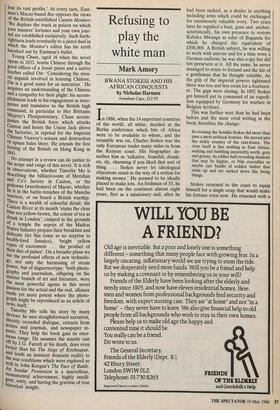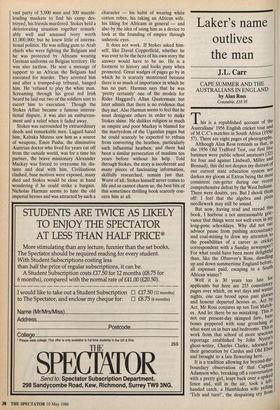Refusing to play the white man
Mark Amory
BWANA STOKESI AND HIS AFRICAN CONQUESTS by Nicholas Harman
Jonathan Cape, £12.95
In 1886, when the 14 important countries of the world, all white, decided at the Berlin conference which bits of Africa were to be available to whom, and the scramble was on, Charles Stokes was the only European trader many miles in from the Kenyan coast. His biographer de- scribes him as 'talkative, boastful, drunk- en, sly, charming if you liked that sort of thing . . . Stokes never let ideological objections stand in the way of a notion for making money.' He seemed to be ideally placed to make lots. An Irishman of 33, he had been on the continent almost eight years, first as a missionary and, after he had been sacked, as a dealer in anything including arms which could be exchanged for enormously valuable ivory. Two years later he supplied a boat, guns and, unchar- acteristically, his own presence to restore Kabaka Mwanga as ruler of Buganda for which he charged the equivalent of £500,000. A British subject, he was willing to work with anyone and for a time wore a German uniform; he was also a spy but did not persevere at it. All the same, he never managed to retire to Ireland and the life of a gentleman that he thought suitable. As the grip of the imperial powers tightened there was less and less room for a freeboot- er. The gaps were closing. In 1892 Stokes got himself put in command of an expedi- tion equipped by Germany for warfare in Belgian territory.
This was further west than he had been before and the most vivid writing in the book describes the change:
In crossing the Semliki Stokes did more than pass a mere political frontier. He moved into the sickly country of the rain-forest. The river itself is like nothing in East Africa, sucking and bubbling inexorably north, grey and greasy, its eddies half-revealing shadows that may be hippos, or Nile crocodiles or maybe just baulks of sodden timber that swim up and are sucked down like living things.
Stokes returned to the coast to equip himself for a single coup that would make his fortune even now. He returned with a vast party of 5,000 men and 300 muzzle- character — his habit of wearing white loading muskets to find his camp des- cotton robes, his taking an African wife, troyed, his friends murdered. Stokes held a his liking for Africans in general — and deteriorating situation together remark- also by the idea of using him as a device to ably well and amassed ivory worth look at the founding of empire through £.1,000,000; but he knew little of interna- unheroic eyes.
tional politics. He was selling guns to Arab It does not work. If Stokes asked him- chiefs who were fighting the Belgians and self, like David Copperfield, whether he he was protected by Africans wearing was ever to be the hero of his own story the German uniforms on Belgian territory. He answer would have to be no. He is a was also tactless. He sent a message of footnote to history and looks puny when support to an African the Belgians had promoted. Great wadges of pages go by in executed for murder. They arrested him which he is scarcely mentioned because and after a trumped-up tribunal, hanged there is so much of importance in which he him. He 'refused to play the white man. has no part. Harman says that he was Screaming through his great red Irish 'pretty certainly' one of the models for beard he laid out two of the soldiers sent to Rider Haggard's Allan Quatermain but escort him to execution.' Though the later admits that there is no evidence that Stokes Affair became a famous interna- they met. Also Harman seems to feel that he tional dispute, it was also an embarrass- must denigrate others in order to make ment and a relief when it faded away. Stokes shine. He dislikes religion as much Stokes was surrounded by extraordinary as empire and poor Mackay is blamed for deeds and remarkable men. Lugard hated the martyrdom of the Ugandan pages but him, Kabaka Mutesa saw him as a source he could scarcely be expected to refrain of weapons, Emin Pasha, the diminutive from converting the heathen, particularly Austrian doctor who lived for years cut off such influential heathen; and there had from the outside world, was for a time his been a similar persecution of muslims ten partner, the brave missionary Alexander years before without his help. Told Mackay was forced to overcome his dis- through Stokes, the story is incoherent and taste and deal with him. Civilisations many pieces of fascinating information, clashed, base motives were exposed, many skilfully researched, remain just that. died and Stokes would be close at hand Worst of all, Stokes himself never comes to wondering if he could strike a bargain. life and so cannot charm us; the best bits of Nicholas Harman seems to hate the old this sometimes thrilling book scarcely con- imperial heroes and was attracted by such a cern him at all.



























































 Previous page
Previous page